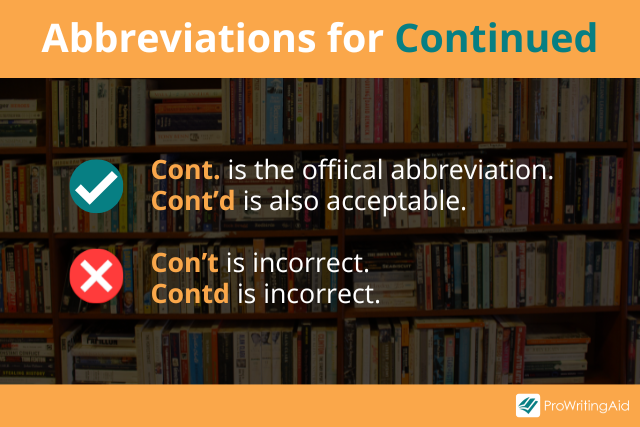
Abbreviations are a tricky aspect of the English language to master. You might feel like there are many potential abbreviations that could be short for continued, like contd, cont’d, and con’t. If you’re struggling to remember which ones you’re supposed to use, you aren’t alone.
So, what’s the correct shortened version of the word continued?
There are two official abbreviations for continued: cont. and cont’d.

This article will give you a complete guide to the correct abbreviation for continued and give you examples of how to use this abbreviation in a sentence.
Should You Abbreviate “Continued” in Formal Writing?
Often, abbreviations are best saved for informal writing because they can come across as slangy or jargony.
However, continued is an exception to this rule. It’s normal to abbreviate continued even in formal writing because this is a common writing convention, which makes your work easier to read.
For example, you’ll often see the truncated form cont. used in academic papers, official legal documents, and other formal contexts. Another example of formal writing is screenplays, where you’ll often see the shortened form cont’d.
The only time you shouldn’t abbreviate continued is when you’re using it in a complete sentence. For example, you would write, “I continued to play tennis, even after I quit the team,” not, “I cont. to play tennis, even after I quit the team.”
How to Abbreviate Continued
There are multiple ways to create the shortened form of a word.
One way is to take the first few letters of that word and add a period afterwards. This method is called truncation. For example, Jan. is a common abbreviation for January.
Another way to shorten a word is to omit certain letters and add an apostrophe in their place. This method is called contraction. For example, gov’t is a contraction for government, which uses an apostrophe in place of the letters ernmen between gov and t.
Both truncation and contraction are acceptable ways to abbreviate continued.
If you choose to take the first few letters and add a period, the truncation for continued is cont. If you choose to omit certain letters and add an apostrophe, the contraction for continued is cont’d.
Let’s take a closer look at all the common abbreviations for continued to see if they fit into these two methods.
Contd
The abbreviation contd without an apostrophe is incorrect. In order to create a proper contraction, you need an apostrophe to mark the spot of the omitted letters between cont and d.
You should avoid using this spelling, as it may look unprofessional.
Cont’d
Cont’d is an acceptable abbreviation for continued. It’s not mentioned in most style guides, but almost all readers will consider it correct.
This spelling is most commonly used in journalistic writing and screenplays.
Con’t
The abbreviation con’t, with an apostrophe before the T, is incorrect because there are no letters omitted between con and t in the word continued, so no apostrophe is needed.
You should avoid using this spelling, since it doesn’t follow the correct rules for creating an abbreviation.
Cont.
Cont. with a period is also an acceptable abbreviation for continued. In fact, it’s the official abbreviation according to most style guides, including the Chicago Manual of Style.
You’ll most commonly see this abbreviation used in business writing and academic papers.
Remember to always use a period at the end of cont. to create the truncated form properly.
Continued Abbreviation Examples in Sentences
Let’s look at some examples of situations when you might want to abbreviate continued.
In journalism and other types of formal writing, you might use the phrase cont. on next page or cont. on page X. These phrases are useful if you run out of space on one page and need to continue an article or story on a later page.
It’s also acceptable to spell out continued in this scenario, to create the phrase continued on next page or continued on page X. Both the abbreviated version and the full version are acceptable.
In screenplays, it’s common to use cont’d to show that the character who was speaking earlier is continuing to speak now. Here’s an example of what this might look like:
SOPHIA
I never meant for this to happen.
(Sophia stands up with a determined look on her face.)
SOPHIA (CONT’D)
But I’m not sorry that it did!
Conclusion on Continued Abbreviation
There you have it—a complete guide about how to abbreviate continued. When in doubt, stick with the truncated form cont., which is almost always considered correct.
If you still need a little help, ProWritingAid will highlight incorrect abbreviations in your writing and help you fix them with one click.


